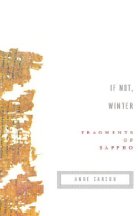
There is something about the partial, the fragmented artwork, that gets me every time. Walking around the National Gallery in London, it was often the sketches, the preperatory and halfway chalked-in pieces that grabbed me, with their bare suggestiveness and uneven illusion. The places where the smooth edge gives way to the rough, where the immaculately shaded line gives way to the hasty implication of form, draws my eye without fail. I love works of art that require the viewer's own mind or imagination to bring them to "completion," to fill out the shapes and fill in the blanks. So it's not surprising that what is possibly my favorite book of poetry is also fragmentary: Anne Carson's translations of Sappho, entitled If Not, Winter.
I think my love for this book is due in equal measure to the stunningly beautiful translation of the parts of the poems that remain, and the spaces of silence where the papyrus has failed. In longer poems, those spaces function as beats of pure rhythm that our minds can fill with meaning or, if they choose, experience solely as pools of quiet. My favorite long poem is an awesome example of this:
I simply want to be dead.
Weeping she left me
with many tears and said this:
Oh how badly things have turned out for us.
Sappho, I swear, against my will I leave you.
And I answered her:
Rejoice, go and
remember me. For you know how we cherished you.
But if not, I want
to remind you.
]and beautiful times we had.
For many crowns of violets
and roses
]at my side you put on
and many woven garlands
made of flowers
around your soft throat.
And with sweet oil
costly
you anointed yourself
and on a soft bed
delicate
you would let loose your longing
and neither any [ ] nor any
holy place nor
was there from which we were absent
no grove [ ] no dance
]no sound
[
To me, this poem would not be nearly so heart-wrenchingly beautiful if it weren't for the spaces of quiet that the poem travels into toward its end. It mirrors so wonderfully the process of comforting a weeping person, which at first is full of talking and crying, much movement of hands and words, and then gradually settles into a quieter, less verbal state. The repetition in the last, fragmentary stanza ("no grove / no dance / no sound"), with the spaces of quiet rhythm between the phrases, is like the touch of a soft hand stroking the back of a person whose weeping has trailed off into silence - or maybe a few brave hiccups. And its effectiveness gains even more from the implication that this isn't the end of the poem: that last bracket implies a continuation of the remembering, of the comforting, but it has been rendered without words by time. It seems to me that most acts of comforting share this quality: the slow meandering into quiet and physical, rather than verbal, communication, and the lack of a stark end-point. That last bracket, where the act of comforting continues, seems to me to mark an indefinite continuation, the analog of sitting quietly with someone for a space of time before one of you suggests taking a walk, or getting a cup of tea, or looks at your watch and says gently that you really should be going.
The shorter fragments have their own special beauty. The fact that they are fragments somehow lends a freedom to them, or me as I read them, so that they can exist as gorgeous pin-points of language, without any expectation of a more "complete" message. Paradoxically, this sometimes allows an image or message to come across with a clarity that probably would have been impossible if I'd been reading a non-fragentary text.
And I on a soft pillow
will lay down my limbs.
Or this one:
]of desire
]
]for when I look at you
]such a Hermione
]and to yellowhaired Helen I liken you
]
]among mortal women, know this
]from every care
]you could release me
]
]dewy riverbanks
]to last all night long
] [
Racy! I love the singular image, alone on a page:
"gathering flowers so very delicate a girl"
Some of the pieces don't even feel fragmentary, just very succinct, like this one:
with anger spreading in the chest
to guard against a vainly barking tongue
I could copy out this entire book with unmitigated glee. I treasure up phrases from it like balms to heal any wound. If Not, Winter is more dog-eared and sticky-note-marked than any other book of poetry I own; perhaps more so than ANY other book I own except my trusty Norton Anthologies of English Literature. Something in my perpetual lust for Sappho via Carson is intangible and difficult to explain, but, like Jesse "that damned lesbian" Helms, I know it when I see it. And, presumably unlike former Senator Helms, I keep coming back for more.
"Into desire shall I come."
"Open out the grace of your eyes."
"you will go your way among dim shapes. Having been breathed out."

